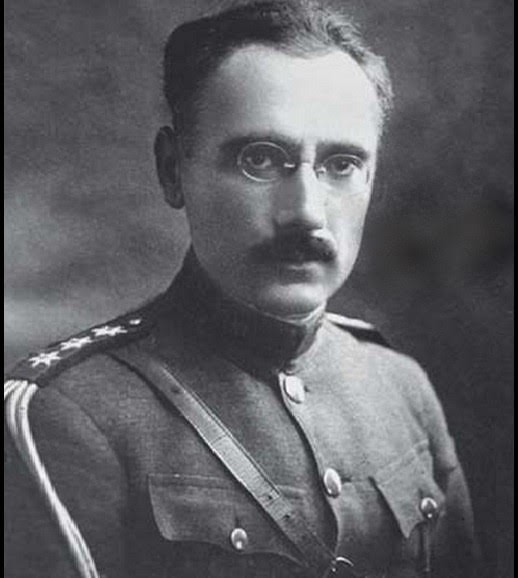By Dr. Michael Matsas
In October 1940, large Italian forces suddenly invaded Greece from Albania. The newspapers kept informing us of a “strategic retreat” until the day the Greek army stopped the enemy’s advance and pushed the Italian troops back. It was rumored that “enas Evreos Colonel” stopped them! That is a Jewish Colonel but it became “Hythreos” Colonel or a Colonel from the Island of Hythra because nobody could believe that the gallant officer Mordechai Frizis was a Jew!
The Greek army retreated in panic, except for the forces of the Jewish Colonel Frizis. Prior to the war, Frizis developed a plan to expel the enemy, which was approved by the Greek General Papagos. Frizis implemented his plan and thanks to his victory against the Italians, the Greek army counterattacked and occupied one third of Albania and stayed there until April, 1941. Colonel Frizis fell in battle while leading his troops on his horse in the front line. The Fascist Prime Minister Metaxas and General Papagos gave him the greatest honors and sent deep condolences to his family.
The Germans who wanted to attack Russia could not wait any longer[1]. They attacked Greece on April 6, 1941. A British expeditionary force was stationed in Greece and in the Greek island of Crete. The conquest of Greece delayed the attack against Russia until June 22, 1941. The Germans were very successful in their conquest of Russia.
In the meantime, a Russian spy discovered that the Japanese army was issuing summer uniforms to the Japanese soldiers. He suspected that Japan was not going to attack Russia. He advised that Russian troops could be sent to defend Moscow against the rapidly advancing German army. Stalin placed General Giorgy Zhukov in charge of the defense of Moscow. By the time the Germans arrived in front of Moscow, it was winter and the German soldiers were still dressed in summer uniforms in the subfreezing weather.[2]
The German army had to fight not only the Russians already there, but also the newly arrived fresh Siberian troops. The German army was defeated in this frozen environment and this was the beginning of the end of Germany in the Second World War. The Russian counter-offensive was successful, ultimately marking a turning point in favor of the Allies in the war in Europe.
Because of Colonel Frizis’ counterattack and Greece’s occupation of one-third of Albania, Germany spent precious time conquering Greece, delaying its attack on Russia, and putting Russia at a military advantage.
Supporting this idea, during the Nuremberg Trials after World War II, German Field Marshal Wilhelm Keitel said, “The unbelievable strong resistance of the Greeks delayed by two or more vital months the German attack against Russia. If we did not have this long delay, the outcome of the war would have been different in the Eastern Front and in the war in general, and others would have been accused and occupying this seat as defendants today.”[3] (In my opinion, he implied that the Allied generals would be tried as war criminals.) In addition, the Greek historian Anastopoulos, in his book History of the Greek Nation, writes, “Frizis executed a defensive maneuver and then a tremendous counterattack, without which the victory of 1940 would not have been realized.” Another Greek historian, Simopoulos wrote in his book, The Italian Division Julia in Pindos, “The honor of the most glorious victory, which basically put an end not only to the battle of Pindos and Smolika, but along the entire front, belongs to the military tactics of Colonel Frizis.”[4],[5]
When I read these statements, one from an enemy general and the others from two historians, my admiration for Colonel Frizis rose to astronomical heights. They emphasize and describe the instinctive, military initiative put forth by Frizis on the front line. I am reminded of two lines of Chaim Nachman Bialik’s famous poem, “Where is the fist that shall smite? Where the thunderbolt to avenge?” Frizis became the fist and the thunderbolt that helped defeat mighty Germany.
This is a unique case in history. The chief of staff of the German army attributes the defeat of Germany to the delay produced by the Greek army. The Greek historians credit this delay to Colonel Frizis. The unbelievable conclusion is that Frizis is elevated after his heroic death to the status of a mythical Greek hero and a great hero of the Second World War.
Greece was extremely proud of its victory in Albania and its contribution in the Allied victory of the Second World War. Colonel Mordechai Frizis was acknowledged as a heroic officer only by a few people every year on the October 28 Greek national holiday (which celebrates the Greek refusal to the Italian ultimatum of 1940). Due to anti-Semitism, the Greek governments did not officially honor him from 1945 until 2002.

[1] Ladislas Farago, Patton, Dell Publishing, 1963, 640.
[2] Werth. Alexander. Russia at War. Discus Books. 1963, 231.
[3] Willis, Yolanda, A Hidden Child in Greece, 2017, 16.
[4] Haralampos Roupas, EAM-Antistasi, March 2002, 8.
[5] In Greece, the two historians Anastopoulos and Simopoulos accused the Greek governments of the previous sixty years for religious discrimination.






